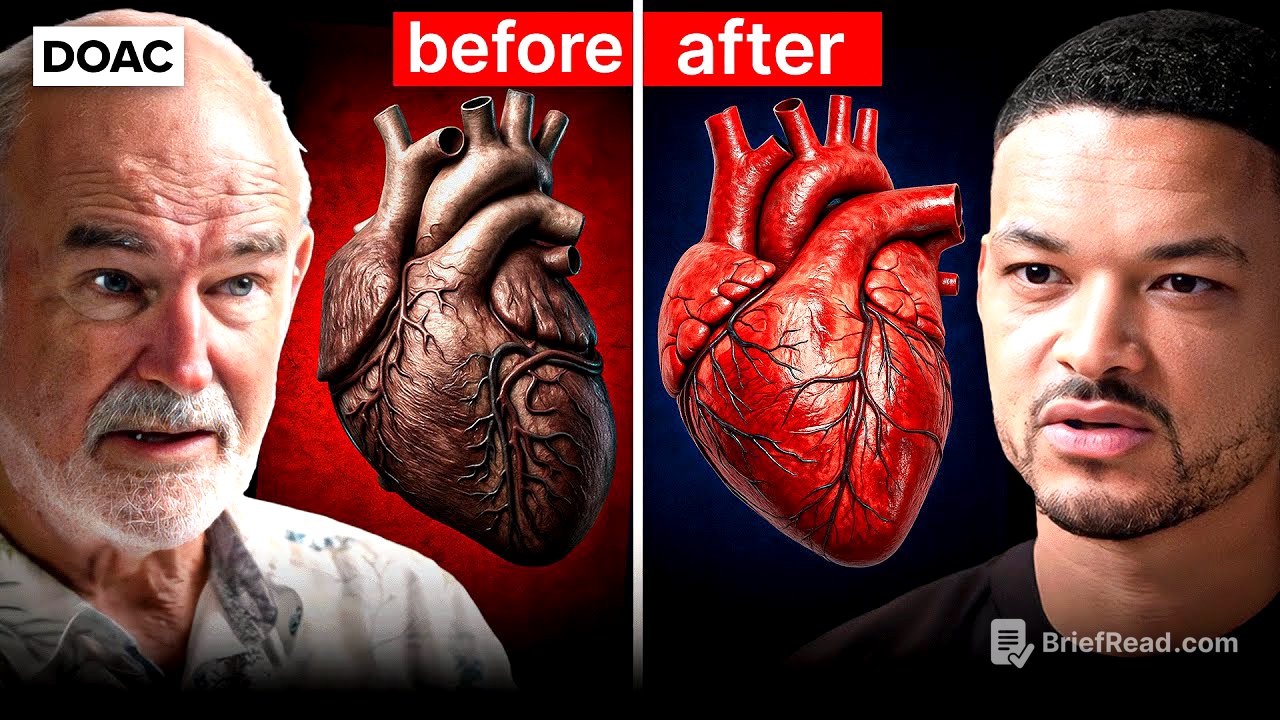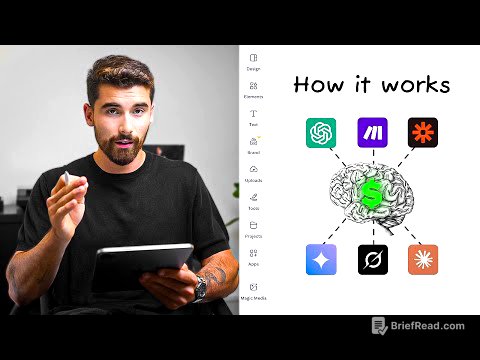TLDR;
Dr. Simon Mills, a pioneer in complimentary medicine, shares his extensive knowledge of herbal remedies, emphasizing their potential to strengthen individuals against life's challenges. He discusses the lost wisdom of plants as medicine, the overuse of antibiotics, and the importance of gut health. He also touches on alternatives to antibiotics and cold drugs, the benefits of specific plants and spices, and dietary recommendations for overall well-being.
- Plants have always been a primary source of medicine, and people have evolved alongside them.
- Western culture has lost touch with the wisdom of plants, but it's crucial to rediscover their potential.
- Overuse of antibiotics is a serious health issue, and there are natural alternatives to consider.
- Gut health is fundamental to overall well-being, and plants play a vital role in supporting it.
- Simple remedies like ginger, cinnamon, and turmeric can have immediate and powerful effects.
Intro [0:00]
Dr. Simon Mills, a respected herbal practitioner, discusses the mission to strengthen people using plants, emphasizing their historical role as primary medicine. He aims to integrate traditional wisdom with modern healthcare, highlighting the immediate effects of herbal remedies and their potential for health empowerment.
The Power of Medicinal Plants [2:15]
Dr. Mills discusses his mission to strengthen people to cope with life's challenges, advocating for plants as a primary medicine source due to their long-standing use and co-evolution with humans. He aims to integrate traditional plant wisdom with scientific frameworks and conventional healthcare norms.
Why Medicinal Plants Help Like Paracetamol Does [6:05]
Dr. Mills addresses the common perception that plants are ineffective compared to modern medicine like paracetamol. He aims to demonstrate the immediate effects of plants and how individuals can quickly determine their effectiveness. He emphasizes that herbal remedies can produce rapid results, often within hours, contrary to the belief that they take months to work.
How Western Culture Is Getting It Wrong [7:22]
Dr. Mills discusses the concept of "health empowerment," encouraging individuals to trust and realize the "miracle within" themselves. He criticizes the over-reliance on fast-food medicine, such as antibiotics and PPIs (Proton Pump Inhibitors), which suppress the body's natural defenses like inflammation. He advocates for recognizing that many perceived problems are actually solutions awaiting support, emphasizing the spectrum between medicine and food.
Why People Should Care About Medicinal Plants [12:24]
Dr. Mills explains that people should care about medicinal plants because they offer solutions for chronic conditions when conventional medicine falls short. He sees patients who have tried various treatments without success and focuses on improving their overall health, sleep, energy levels, and bodily functions. He aims to identify the root causes of their conditions by examining their health history and addressing underlying issues like digestion, kidney function, and circulation.
Helping 10K+ People With Plants [14:46]
Dr. Mills estimates he has seen over 10,000 patients, engaging deeply with their stories to understand the root causes of their chronic conditions. He mentions that about a quarter of his patients are living with cancer, where he focuses on improving their quality of life rather than treating the cancer directly. Additionally, a significant portion of his patients deal with chronic inflammatory and autoimmune diseases, where he aims to enhance underlying bodily functions.
Patients Simon Has Helped [14:48]
Dr. Mills shares case studies of patients he has helped, including Heather, a 65-year-old with a severe skin disease (erethema multiforme) linked to lung damage and vitamin B12 deficiency. By addressing her gut lining and lung issues with a combination of remedies, her itching subsided within a week, and the skin problem eventually disappeared. Another case involves Karen, a 37-year-old with panic attacks and anxiety, which Dr. Mills linked to liver distress from a past jaundice diagnosis. By focusing on improving her liver function and metabolism with herbs like milk thistle and artichoke leaf, her anxiety and menstrual cycles stabilized.
Case Study: Healing Through Plants [16:28]
Dr. Mills shares case studies of patients he has helped, including Heather, a 65-year-old with a severe skin disease (erethema multiforme) linked to lung damage and vitamin B12 deficiency. By addressing her gut lining and lung issues with a combination of remedies, her itching subsided within a week, and the skin problem eventually disappeared. Another case involves Karen, a 37-year-old with panic attacks and anxiety, which Dr. Mills linked to liver distress from a past jaundice diagnosis. By focusing on improving her liver function and metabolism with herbs like milk thistle and artichoke leaf, her anxiety and menstrual cycles stabilized.
The Gut Controls Almost Everything [23:41]
Dr. Mills emphasizes the gut's critical role in overall health, highlighting that the digestive system makes intelligent decisions as food travels through it. The gut lining is full of sensors that pick up chemical cues and trigger metabolic and hormonal functions. He also discusses the microbiome, the billions of bacteria in the gut, which significantly influence bodily functions.
The Dangers of Becoming Antibiotic Resistant [27:35]
Dr. Mills discusses the dangers of antibiotic resistance, emphasizing that it is a serious and growing health issue. He notes that antibiotics kill both good and bad bacteria, reducing the diversity of the microbiome. He also points out that antibiotics are ineffective against viral infections, yet they are often prescribed unnecessarily, contributing to the rise of antibiotic-resistant bacteria.
Alternatives to Antibiotics [33:28]
Dr. Mills suggests alternatives to antibiotics for viral infections like colds and flu, emphasizing that antibiotics are useless against viruses. He recommends using warming spices like ginger and cinnamon to stimulate circulation and loosen mucus. He explains that ginger, cinnamon, turmeric, black pepper, and chilies stimulate pain fibers, opening blood vessels and promoting warmth, which can help the body fight off infections.
Alternatives to Cold Drugs [39:42]
Dr. Mills continues discussing alternatives to cold drugs, focusing on the use of ginger and cinnamon tea to provide warmth and stimulate circulation. He explains that ginger and similar remedies stimulate pain fibers, leading to a reflex response that opens blood vessels and loosens mucus. He also introduces cardamon as a warming and nourishing spice, and contrasts warming remedies with cooling remedies like mint, which contain bitters.
Vitamin D and Zinc for Infection Protection [52:36]
Dr. Mills discusses the potential benefits of vitamin D, vitamin C, and zinc in improving natural resistance to viruses. While he doesn't consider supplements imperative for everyone, he acknowledges that vitamin D supplementation can be beneficial, especially in regions with limited sunlight.
Garlic Benefits [56:27]
Dr. Mills highlights garlic's antibiotic role and its use as "Russian penicillin." Raw garlic is a powerful prebiotic that supports gut flora. He suggests a "garlic intensive" treatment for disrupted gut flora or low-level infections, involving swallowing chopped garlic cloves over a weekend to boost the good bacteria in the microbiome.
Remedies for Chronic Pain [59:57]
Dr. Mills discusses remedies for chronic pain, particularly joint and back pain caused by inflammation. He explains that inflammation (indicated by the suffix "itis") is the body's way of bringing more blood to clean the joint. He recommends using mustard or cayenne pepper plasters to bring blood to the area directly, reducing the need for inflammation and alleviating pain.
Arthritis Relief Medicinal Plant [1:03:02]
Dr. Mills continues discussing arthritis relief, mentioning that Native Americans used cayenne as a salve for bad joints, while Europeans used mustard plasters. He suggests a mustard bath for arthritis in the fingers, emphasizing that these methods help bring blood to the area and ease pain. He also shares a personal anecdote about relieving his own back pain through dancing and letting the music loosen knots.
Should We Take Anti-Inflammatory Pills? [1:09:15]
Dr. Mills discusses the use of ibuprofen and other anti-inflammatory drugs, noting that while they can relieve pain, it's important to understand why inflammation is occurring in the first place. He emphasizes that inflammation is a defense mechanism and suppressing it without addressing the underlying cause can be problematic. He distinguishes between acute and chronic inflammation, advising against suppressing acute inflammation unless necessary for short-term relief.
The Superpower of Purple Vegetables [1:12:49]
Dr. Mills advocates for eating a "rainbow" of colorful fruits and vegetables, as each color represents beneficial plant constituents like polyphenols. He highlights purple and blue foods, rich in anthocyanins, for their powerful effects on blood supply, eyesight, brain health, and blood pressure control. He suggests that we are "purple deficient" and should incorporate more purple foods like beetroot, berries, and purple carrots into our diets.
Your Diet Recommendations [1:17:27]
Dr. Mills recommends a diet rich in root vegetables, greens, grains, lentils, peas, and beans for their prebiotic benefits. He suggests aiming for 30 different types of plants per week to ensure diversity. He also notes that healthy meals can be made affordably by incorporating simple vegetables and spices, as seen in Asian cuisine.
Keto Diet and Sugar [1:18:23]
Dr. Mills discusses the keto diet, noting its potential benefits for some individuals due to its reduction of sugars and carbohydrates. He explains that sugars can slow down metabolism, and removing them can free up energy. While the keto diet may have mixed effects on the microbiome, it can strain liver and kidney function, so monitoring these functions is important.
Keto Diet and the Menstrual Cycle Link [1:20:24]
Dr. Mills explains that the keto diet can improve insulin sensitivity, which is beneficial for menstrual problems and conditions like PCOS (polycystic ovary syndrome). He notes that insulin resistance can disrupt hormone balance and the menstrual cycle, so reducing sugar intake through a keto diet can help stabilize these issues.
Can PCOS Symptoms Increase From Sugar? [1:22:58]
Dr. Mills emphasizes that modern diets contain excessive sugar, which our bodies were not designed to handle. This puts stress on the system and affects insulin, contributing to insulin resistance and related issues like PCOS and infertility.
Medicinal Plants to Increase Fertility [1:24:21]
Dr. Mills discusses the use of medicinal plants to increase fertility, particularly by stabilizing the menstrual cycle and making the fertile phase more productive. He mentions using a mix of herbs drawn from about 100 different plants, often based on women's remedies developed by women. He notes that some North American remedies contain plant equivalents of steroids that can retime the menstrual cycle.
Healing Benefits of Echinacea, Frankincense, and Myrrh for the Upper Body [1:27:41]
Dr. Mills highlights the healing benefits of echinacea, frankincense, and myrrh, particularly for infections and problems of the mouth and throat. He explains that echinacea stimulates white blood cells in the upper respiratory system, while frankincense and myrrh, both resins, have been valued for their medicinal properties since ancient times.
Water Fasting and Long Fasts [1:34:38]
Dr. Mills discusses the effectiveness of water fasts and prolonged fasts, noting that intermittent eating is part of our genetic makeup as hunter-gatherers. While fasting can be beneficial, it can also be damaging if metabolism, digestion, or hormones are not in prime condition, so advice is needed.
Cancer Prevention [1:35:58]
Dr. Mills discusses cancer prevention, emphasizing the importance of diet. He notes that while there are things we can do to help reduce the risk of cancer, the main risk is poor diet generally. He suggests that correcting poor diet can prevent cancer.
Cardiovascular Health Improvements [1:38:03]
Dr. Mills discusses cardiovascular health, noting that cardiovascular disease is a form of long-term inflammation. He recommends spices and hawthorne as beneficial for cardiovascular health.
Benefits of Turmeric Consumption [1:39:50]
Dr. Mills discusses the benefits of turmeric, emphasizing that its active compound, curcumin, is not well-absorbed into the blood but is highly beneficial for the microbiome. He explains that curcumin encourages good bacteria, which break it down into more available materials, making it effective for inflammatory modulation in the gut.
Prebiotics, Probiotics, and Postbiotics [1:42:24]
Dr. Mills explains the roles of prebiotics, probiotics, and postbiotics in gut health. Probiotics are living organisms, prebiotics are foods that encourage good bacteria, and postbiotics are anything that the bacteria produce. He notes that many plant-based foods are converted by the microbiome into medicines.
The Shocking Benefits of Curcumin [1:44:14]
Dr. Mills references studies showing that curcumin upregulates antioxidant defenses and downregulates oxidative stress, with effects comparable to ibuprofen for pain relief. He notes that curcumin is effective for arthritis and joint pains, and that early studies show the impact that curcumin can have on brain health.
Cocoa Powder Healing Benefits [1:51:17]
Dr. Mills highlights the healing benefits of dark chocolate (cacao), emphasizing its positive effects on brain and cardiovascular health. He notes that studies have shown that cocoa can improve blood flow within minutes of consumption. He recommends consuming 50-100g of 75% or more dark chocolate daily as a medicine.
Shocking Link Between Alzheimer’s and Green Tea [1:55:34]
Dr. Mills discusses the association between green tea and Alzheimer's disease, noting that green tea contains polyphenols that seem to be particularly effective in modulating the barrier between the brain and the rest of the body. He mentions that regular consumption of green tea seems to be linked to less cognitive decline and dementia.
Cholesterol and Statins — Is There an Alternative? [1:57:28]
Dr. Mills discusses cholesterol, explaining that it is a type of fat made in the liver that is essential for hormone production and bodily functions. He notes that high cholesterol levels are a risk factor for cardiovascular disease, and doctors often prescribe statins to reduce cholesterol levels. He suggests that a better approach is to recontextualize cholesterol by adopting a plant-based diet and exercising.
Omeprazole [2:02:54]
Dr. Mills discusses omeprazole, a widely prescribed drug for acid reflux, noting that it shuts down acid production in the stomach, which can lead to problems because acid is important for sterilizing food. He mentions that long-term omeprazole use is associated with cancers and dementias, and it is difficult to come off it due to a rebound effect. He recommends using the "raft principle" with mucilaginous plants like slippery elm or products like Gaviscon to create a physical barrier against reflux.
How to Keep Up With a Fast-Changing World [2:09:19]
Dr. Mills answers the question of how to keep up with a fast-changing world by emphasizing the importance of reconnecting with loved ones and nature. He suggests that as the world gets more frightening, the connections we make with each other become more important.








